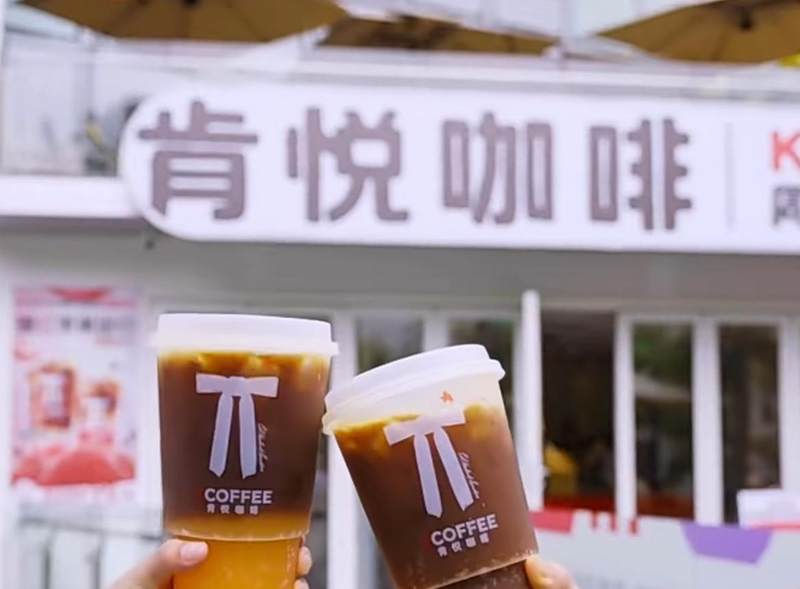Some industry insiders pointed out that the success of Kenyue Coffee’s “shoulder-to-shoulder” model still needs to be verified by the market.
Stores have increased 14 times, selling 250 million cups a year. Yum’s Kenyue Coffee has broken through “side by side”

Photo source: Kenyue Coffee
Blue Whale News, February 7 (Reporter Sun Yu)On February 6, Yum China (9987.HK) announced its 2024 full-year results report. Annual revenue was US$11.3 billion, a year-on-year increase of 5%(excluding the impact of foreign currency conversion); net profit was US$922 million, a year-on-year increase of 10%; Diluted earnings per share was US$2.33, a year-on-year increase of 18%.
Throughout 2024, Yum China will add 1751 stores, bringing the total number of stores to 16395, including 11648 KFC stores and 3724 Pizza Hut stores.
When talking about performance growth, Yum China management pointed out at the earnings call on the evening of February 6 that KFC is still the company’s main growth engine and profit contributor. Among them, KFC’s coffee business (referred to as Kenyue Coffee) is one of the key growth engines for the brand. In 2024, KFC sold a total of 250 million cups of coffee, a year-on-year increase of 30%. The number of stores increased from 50 at the beginning of the year to 700, and the target of reaching 1300 in 2025.
Official data show that KFC began selling coffee as early as 2014. By 2016, the cumulative sales of affordable freshly ground coffee had exceeded 100 million cups. At that time, KFC’s coffee business was still positioned as a meal accompaniment, as an additional service to help KFC increase transaction volume during breakfast and afternoon tea periods.
In October 2022, KFC opened its first independent coffee store. In 2023, it opened several coffee stores one after another and named them KCOFFEE. At that time, Yum China CEO Qu Cuirong said that Kenyue Coffee planned to expand at a quite radical pace, opening stores to 400 stores in 2024.
Judging from the facts, Kenyue Coffee’s actual store opening process is more radical. As of the end of 2024, the number of stores has reached 700, a 14-fold increase in one year. Narrow-door dining data shows that as of January 10, 2025, the number of stores in Kenyue Coffee is 723, with per capita consumption of 16.66 yuan, covering 207 cities in 30 provinces across the country, and nearly 60% of the stores are distributed in second, third and fourth-tier cities.
Among Kenyue Coffee’s many products, bubble American, snow top coffee, and huge egg tarts are popular among consumers. In addition to classic coffee, a variety of creative drinks such as egg tarts DIRT, ice-sucking mung bean raw coconut lattes, and hand-shaking frozen pear American have been launched one after another. A single cup of coffee is priced within 22 yuan, and after discounts, the price is between 9.9 yuan and 20 yuan. The main price is 9.9 per day. In addition, through monthly card promotions and limited time discounts, it attracts more price-sensitive consumers and competes with coffee brands such as Ruixing and Kudi.
Yum China CEO Qu Cuirong once mentioned Kenyue Coffee’s expansion strategy, relying on KFC’s side-by-side model to share kitchen resources with KFC stores, reduce initial investment and operating costs, and accelerate its sinking into third-and fourth-tier cities.
Industry insiders pointed out that Kenyue Coffee is backed by KFC, which has 11,000 stores, and adopts a side-by-side model. On the one hand, it can effectively reduce operating costs. Relying on Yum China’s mature supply chain system, it can achieve large-scale procurement and efficient distribution, and support Profitable space under the low-price strategy. On the other hand, reusing KFC store location, membership system and operating experience can reduce market education costs and increase sales points.
However, there are also objections that the site selection logic of KFC and Kenyue Coffee is essentially different. Coffee shops are more open near office buildings to facilitate office workers to visit the store, while fast food restaurants are more open in large passenger traffic. In the neighborhood, some side-by-side stores are limited by mismatch in passenger traffic.
From the perspective of market competition, Kenyue Coffee is facing the impact of low-cost coffee from fast food brands such as McDonald’s, Wallace, and Tastin, as well as the continued price war between Lucky and Cudi. The success of the side-by-side model remains to be followed by the market. Verification.
Shen Meng, director of Xiangsong Capital, said in an interview with Blue Whale News: The coffee market is not yet saturated. Although the competition in the low-price market is fierce, there are still many segmented demand ranges. As two major global fast food giants, McDonald’s and KFC have used their huge store networks to launch their own coffee brands. This model can achieve rapid expansion at a lower cost and open up new incremental customers for stores, coffee and fast food. There is no conflict between the two. rdquo;。
“As KFC’s new business, how to more clearly position the coffee business as an accessory of fast food or an independent business developed through the fast food network will determine the growth trend and potential of the coffee business in the future. rdquo; Shen Meng added.



